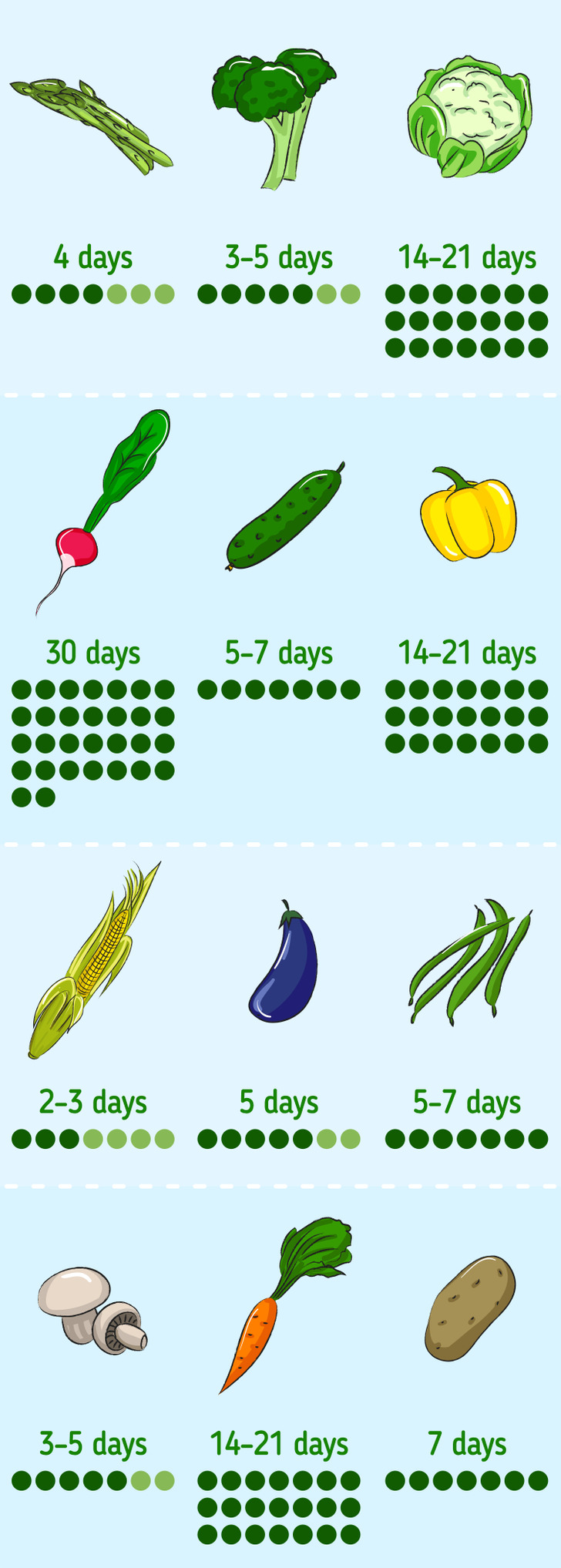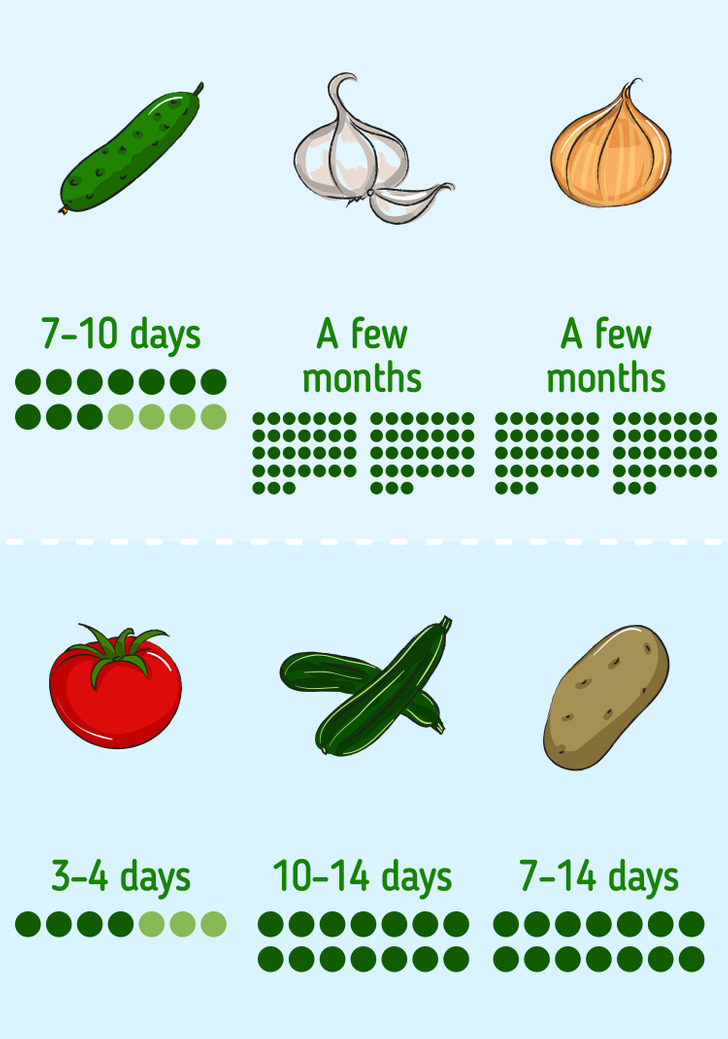How Long Vegetables Last in the Fridge
Not all vegetables should be stored in similar conditions. Some vegetables can retain their health benefits by staying in the fridge for a few days or even weeks, while others prefer high or neutral temperatures.
To help you store your vegetables correctly, 5-Minute Crafts prepared a guide for you that will let you know what vegetables should be stored in the fridge and what vegetables require a warmer place.
Vegetables that are best to be kept in the fridge or in the cellar

Most vegetables store well at low temperatures and relatively high humidity. A refrigerator, cellar, or cool pantry can keep them fresh.
Since food in the fridge tends to dry out, it’s best to store vegetables in the crisper drawer or perforated plastic bags. For long-term storage of root vegetables (carrots, beets, and others), the best storage place will be a cellar.
- Asparagus has a relatively short storage time and will stay fresh in the fridge for about 4 days. Wrap the base of the stems in a damp paper towel and cover them with a plastic bag or place the greens in a mug of water. When the asparagus is starting to go, you’ll see that the tips of the stems turn dry and withered.
- Broccoli and Brussels sprouts can stay fresh for 3-5 days. Please note that both vegetables are best stored in the crisper drawer, in a perforated plastic bag, and away from fruits that emit ethylene. If you put cabbage next to them, it will become yellow faster.
- Red or white cabbage can be kept in the fridge for about 2-3 weeks.
- Cauliflower, like broccoli, keeps well in a perforated plastic bag. It can stay fresh for 2-3 weeks in the fridge.
- Radishes can be kept in a perforated plastic bag inside the fridge for about 1 month.
- To keep cucumbers fresh and crisp longer, try to keep the humidity around them to a minimum. Make sure the vegetables are dry before placing them in the bag, then wrap them in a paper towel. You can safely refrigerate cucumbers packed like this for 5-7 days.
- When refrigerated, bell peppers remain fresh for an average of 1 to 2 weeks. However, only dry fruits should be refrigerated. Wet bell peppers will quickly become moldy and slimy.
- Fresh corn should be consumed as soon as possible. After harvest, the natural sugars in the corn turn into starch over time, which affects its taste. Unpeeled corn can be stored in the fridge for 2-3 days by wrapping the cob in a damp towel.
- Zucchini and eggplant can last in the fridge for about 5 days.
- Beans and green beans can be stored in the fridge for about 5-7 days. It’s better to keep them in a perforated plastic bag and monitor their condition: at too low temperatures, they will begin to deteriorate faster.
- Mushrooms, of course, are not vegetables, but the storage rules for them are similar. Mushrooms will remain fresh longer if you place them in a paper bag. You can store them for 3-5 days.
- Carrots, beets, and turnips should ideally be stored in a cellar or basement, sprinkled with a thin layer of sand. If you don’t have a basement, you can refrigerate these vegetables and use them within 2-3 weeks.
- Squash can become stringy when exposed to high temperatures, so it’s best to keep them in a cool, dark, and well-ventilated area. Squash can be stored for about 2 months this way.
- To prolong the freshness of new potatoes, they can be stored in the fridge for about 1 week.
Vegetables that shouldn’t be kept in the fridge

Some vegetables react negatively to cold and prefer moderate temperatures. It’s better not to store them in the fridge, but rather, to keep them in a cool part of the kitchen, like in a closet, on a shelf, or in a pantry specially designated for this.
- Although cucumbers can easily be stored in the fridge for several days, they will also do just fine out of it. Place the vegetables in a breathable plastic bag and store them in a cool place. Cucumbers can last 7 to 10 days this way.
- You can store garlic in a dry, cool, dark place for several weeks or even months. But you should not put it in the fridge, as this may cause sprouting.
- Onions, like garlic, should not be refrigerated but stored in a dry, cool, well-ventilated place. It’s best to store them in mesh bags to get that ventilation, or in a box with ventilation holes. This way, they can last for a couple of months. Please note that onions shouldn’t be stored next to potatoes. Potatoes release moisture, which can cause onions to rot faster.
- Storing tomatoes in the fridge can affect their taste and make them mealy. Keep tomatoes out of direct sunlight and store them at room temperature for 3-4 days.
- Although zucchinis can be stored in the fridge, they can last longer in a cool place in the kitchen for 10 to 14 days.
- Mature potatoes should not be refrigerated. At too low temperatures, starch begins to break down in them. Arrange a place in the cellar if possible, and store potatoes at about 40°F in a box lined with a thin layer of damp sand. If you don’t have a cellar or pantry, keep potatoes in a paper bag in a cool, dry place for 1-2 weeks.